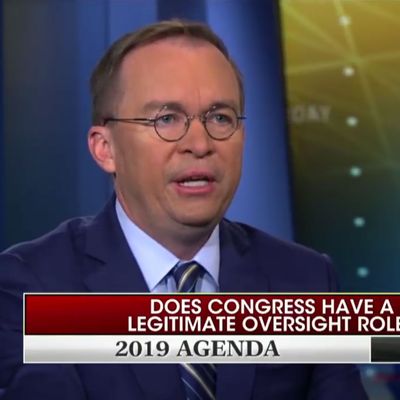
White House chief of staff Mick Mulvaney, appearing on Fox News Sunday, repeated the official administration line that Democrats had to choose between legislation and investigation. Chris Wallace reminded Mulvaney that he had supported a Republican Congress that had engaged in continuous investigations of the White House, reopening probes to chase conspiracy theories even after they had been conclusively debunked.
This prompted Mulvaney to make an interesting confession. The Republican Congress never wanted to pass laws in the first place:
WALLACE: You were there, of what the Republicans did to Barack Obama and Hillary Clinton on Benghazi, on Fast and Furious. And they got some things done despite the fact that these were aggressive partisan investigations.
MULVANEY: Well, we didn’t get very much done. Listen, I’ll be the first to admit that when the tea party wave, of which I was one, got here in 2011, the last thing we were interested in was giving President Obama legislative successes.
When somebody says “I’ll be the first to admit,” it’s usually an idiom, suggesting they are not trying to hide a fact that is widely known and frequently confessed. But in this case the sentence construction makes more sense if read literally. Mulvaney may actually be the first person to admit that congressional Republicans did not want to give Obama any legislative successes at all.
Mitch McConnell boasted that he pressured Republicans to refuse to compromise with any of the Obama administration’s priorities in his first two years (“We worked very hard to keep our fingerprints off of these proposals. Because we thought — correctly, I think — that the only way the American people would know that a great debate was going on was if the measures were not bipartisan.”).
Yet after Republicans won control of Congress on the shoulders of a tea party wave of debt hysteria in 2010, a conventional wisdom took hold that President Obama needed to get Republicans to make a deal. Most outside observers conceded that the congressional GOP might not be the easiest negotiating counterparty. Still, Obama was widely held to bear a share of the blame for his inability to get Republicans to make a deal. He didn’t play enough golf with them, or drink enough with them, or “lead.” The idea that Obama could and should force Republicans to make deals with him was pure conventional wisdom for years on end.
As a high-profile link between the Obama-era Republican Congress and the Trump administration, Mulvaney has retrospectively clarified a lot of points people refused to understand at the time. Mulvaney casually confessed last week that nobody cares about the deficit. Mulvaney of course spent the Obama era claiming to care about the deficit a lot — so much, indeed, that he was willing to shut down the government or even default on the national debt in order to reduce it. The debt hysteria was manufactured to cover a different agenda. Republicans wanted to force Obama to reduce popular domestic spending programs so they could cut taxes for the affluent. But since neither cutting retirement programs nor reducing taxes for the rich are popular goals, Republicans framed their policy as “deficit reduction,” and the debt-scold community and most of the mainstream news media took this framing at face value.
That’s one reason why Obama couldn’t make a deficit deal with Republicans: They didn’t care about the deficit. Also, as Mulvaney now casually concedes, they didn’t want to give him any accomplishments at all, so even if Obama offered a deal they could live with, they would have opposed it rather than allow him to claim legislative success.
The Republican Party of the last quarter century regularly toggles between methodological extremes. When they gain the presidency, they dismiss congressional oversight and fiscal responsibility alike as totally unnecessary. When they relinquish it, they pursue both to fanatical extremes. Either they are blowing up the deficit and covering up wild crime sprees, or they are demanding senseless austerity and conducting permanent, redundant investigations of phantasmal Fox News–generated nonevents.
Typically, they roll out a new cast of characters to justify the stance of the moment and allow the old ones to fade into the sunset. The Clinton-era inquisitors of Capitol Hill were gone from the scene when the Bush administration was escaping oversight and rolling up debt. The Bushies faded into the background when Obama-era Republicans waxed hysterical about debt and scandal. Now a new reversal is upon us. Unfortunately for Trump’s party, Mulvaney is still with us to answer for the past.






























